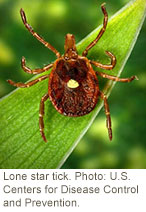
WEDNESDAY, April 10 (HealthDay News) — A red meat allergy linked to certain tick bites has affected some Virginia children, researchers strongly suspect.
From September 2011 to May 2012, 45 children aged 4 to 17 developed itching and had trouble breathing after eating red meat, the study found. All had been bitten by a tick in the past year. Of these, more than 45 percent sought care in the emergency room for their symptoms, and 8 percent were admitted to the hospital.
Previously documented in adults, this phenomenon has been linked to the Lone Star tick, which commonly is found in the eastern and southern United States. Cases also are being reported in central states such as Oklahoma, Nebraska and Missouri, said study co-author Dr. Scott Commins, an assistant professor of medicine and pediatrics at the University of Virginia.
The tick injects spit into the body when it bites, and the body develops antibodies to a carbohydrate in the tick’s spit that is known as alpha-gal. This carbohydrate is also present in red meat, so when an infected person eats meat, an allergic reaction is triggered.
Unlike other allergic reactions that occur immediately, this reaction tends to occur within three to six hours after eating red meat.
“The reactions can be … life-threatening, where an [epinephrine] pen is needed,” Commins said.
The new findings appear in the May print issue of the journal Pediatrics.
Because participants entered the study well after their allergic episodes and the researchers did not see their reactions firsthand, it was not proven that tick bites leading to meat allergy was the cause. Blood samples from the children, however, showed they developed antibodies to alpha-gal.
“Parents should look out for tick bites that remain persistently reddened and itchy, as well as for allergic symptoms that occur three to six hours after eating a meal with mammalian meat,” Commins said. “Symptoms can [include] hives, swelling, diarrhea and abdominal pain.”
The researchers think the problem is becoming more common, although there were study participants who said they have had the allergy for more than 30 years, Commins said.
And the study results “show clearly that physicians should keep this diagnosis in mind even in the pediatric population, especially if the history is consistent with the disease syndrome, including delayed symptoms after ingestion of beef, pork, lamb or even milk,” the researchers wrote.
No current remedy exists, Commins said, “but the allergy does seem to fade over time so it is unlikely to be lifelong.”
Another expert discussed the study’s implications.
“This is an important phenomenon to be aware of when evaluating children who present with delayed allergic reactions as opposed to more classic reactions that occur within five to 30 minutes after exposure to an allergen,” said Dr. Robert Glatter, an emergency medicine physician at Lenox Hill Hospital in New York City. “Symptoms can include hives, a change in voice or difficulty swallowing associated with throat swelling after eating a hamburger or a hot dog.”
The message for parents is clear: “If your child get hives or a rash without any explanation, try to determine what they ate within the past three to six hours, and if it was beef, lamb or pork, you should consult an allergist, especially if your family spends a lot of time outside in areas often inhabited by ticks,” Glatter said. “In children living in areas where the Lone Star tick is common, the alpha-gal syndrome should be considered a prime suspect.”
Dr. Artemio Jongco, an allergist at Cohen Children’s Medical Center in New Hyde Park, N.Y., emphasized that a reaction might require emergency care.
People who develop this allergy may need shots of epinephrine as well as observation in the emergency room, including treatment with antihistamines and steroids to control their symptoms, Jongco said.
“At a minimum, patients who present … with this history and constellation of symptoms should be prescribed and instructed on the use of an epinephrine autoinjector, and warrant a referral for further evaluation by an allergist,” Jongco said. “Moreover, patients with suspected [allergic reaction] and a history of tick bites should be evaluated by an allergist for potential alpha-gal sensitivity.”
More information
Learn how to avoid ticks at the U.S. Centers for Disease Control and Prevention.

